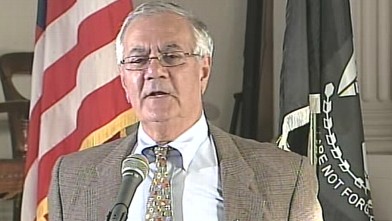Barney Frank Will Retire From Congress

ABC News, WCVB
Rep. Barney Frank, the first serving member of Congress to come out as gay and a powerful Democrat whose name is attached to the sweeping Wall Street reform bill, announced today that he will not seek reelection in 2012.
“I am required to choose. I have to choose between fulfilling my obligation as a ranking member of the Financial Services Committee on behalf of financial reform and my responsibility to continue to be a full representative of the people who voted for me in 2010,” Frank said in a statement to reporters in Newton, Mass. Monday afternoon. ”I do not choose to run for Congress in 2012.”
Frank said he believes that if he had decided to run he would have won in 2012, but the challenges created by redistricting proved not to be worth an attempt to extend his tenure for two more years.
“I don’t want to be torn between a full-fledged campaign in a district with 325,000 new people, and my obligation to the existing constituents,” Frank said. “I would be asking 325,000 new constituents to give me the mandate to be their advocate with the federal government for only two years. Starting on a series of projects only to be passing them along in various stages of incompletion to a successor two years later is not a responsible way to act.”
Frank became the member of Congress to come out as gay six years after he first took office, coming out in 1987 and breaking an important barrier in American politics.
Asked what sort of legacy he hoped to leave behind in Congress, Frank said that “people should leave their legacies to other people to describe,” but admitted that his coming out will likely highlight his career.
“The best antidote to prejudice is reality because prejudice by definition is based on ignorance,” Frank said. “I am proud by my finally coming out – I was 47. It didn’t happen in a clean sweep, but when I volunteered finally to come out in 1987, I do think it was helpful.”
Frank survived scandal to become one of the most powerful Democrats on Capitol Hill during more than 30 years in office. The Massachusetts congressman chaired the House Financial Services Committee when Democrats were in the majority from early 2007 until early 2011, becoming the main House Democrat overseeing the financial industry during one of the most turbulent economic eras of U.S. history.
Frank was instrumental in ushering the Wall Street bailout through Congress in 2008. And he, along with former Sen. Chris Dodd, have their names attached to a sweeping Wall Street reform bill passed through Congress and signed into law by President Obama in 2010.
Dodd resigned in 2010 rather than face a tough reelection fight.
The Wall Street reform bill – known as “Dodd-Frank” – placed tough new rules on the financial sector as a way to avoid future mortgage crises. It also enacted a new Consumer Financial Protection Bureau to protect Americans from large corporations. The law has been pilloried by Republicans as Washington overreach.
Frank is noted on Capitol Hill for his unkempt appearance, often untucked shirttails and pugnacious speaking style. He often dismisses reporters’ questions with disdain, has a quick wit, and is known to verbally joust with colleagues.
“One of the advantages to me of not running for office is I don’t even have to pretend to try to be nice to people I don’t like,” Frank said, drawing laughter. “Now, some of you may not think I’ve been good at it, but I’ve been trying and the notion of being a lobbyist and having to go and try to be nice to people I don’t like would be ridiculous.”
He has not been without controversy. Frank admitted to paying a male prostitute who was living in his Capitol Hill apartment in the 1980s and servicing other clients there.
Frank survived attempts to expel him from the House and stayed on to become one of the most powerful Democrats in Washington. He will discuss his decision not to run in Boston at a 1 p.m. news conference.
Democrats do not expect to have a problem winning the district in Frank’s absence. Barack Obama and Sen. John Kerry both garnered more than 60 percent of the vote there in 2008.
But today, Frank said he intends to make a clean break from politics as he pursues other interests.
“I will neither be a lobbyist, nor a historian. I promise you on both,” Frank pledged today in a thinly veiled swipe at former House Speaker Newt Gingrich. “I do not intend to practice law, although I have a law degree. I might show up pro-bono some day for a gay rights case. My intention would be to do some combination of writing, teaching and lecturing.”
UPDATE: A previous version of this post listed Frank as the first openly serving gay member of Congress. He was in fact the second. He was the first Congressman to come out as gay while in office.